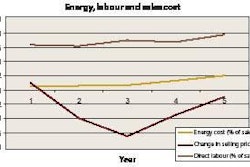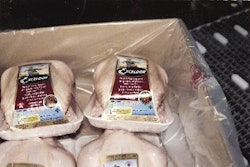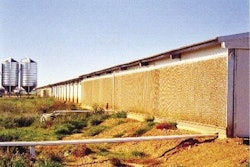The free-range egg scam that hit United Kingdom (UK) producers and consumers in November 2006 has re-surfaced. DEFRA (Department of Environment, Food and Rural Affairs) claims that UK consumers could have been swindled for five years to the tune of UK£50 million and 500 million bogus free-range and organic eggs.
The underlying cause of the alleged scam is a one-million-a-week shortfall in free-range and organic eggs. Unscrupulous middle men have been importing unmarked cage eggs from battery farms in Europe and stamping them as UK free-range or organic eggs. Technically, this should not happen because European Union (EU) regulations require all eggs to be stamped in the country where they are produced. For instance all eggs produced in France are required to be stamped ‘FR’. Further coding as 0, 1, 2 and 3 for, respectively, organic, free range, barn and cage eggs show the housing conditions under which they are produced.
Investigation has failed to reveal any shipment of unmarked eggs from Germany to the UK but eggs from France and Spain are also been under suspicion. Authorities believe lax inspection at UK ports has allowed the illicit trade to continue. Even cursory checks would have identified unstamped eggs especially over such a long period of time.
Apart from undermining UK producers and swindling consumers, the racket could have far wider implications for consumer health because eggs from some EU countries have unacceptably high levels of salmonella. UK Food Standards Agency (FDA) discovered salmonella contamination in one in every 30 boxes of imported eggs on sale in the UK with particular problems for Spanish eggs where one in every eight boxes carried infection.
At least ten 44-tonne articulated trucks, each carrying 225,000 eggs, arrive in the UK every week and have done so for at least 5 years. Most UK consumers shop at leading supermarket chains reasonably believing they are the safest, but reports in The Times of London suggest giant retailers including Tesco and Morrisons may have been affected.
Such scams are clearly profitable because the free-range product at around £1.00 for six eggs retails at a 100 percent premium on standard factory farm eggs laid by caged birds. UK free-range and organic producers are angry, saying supermarkets are partly to blame for driving down prices to levels where UK farmers cannot afford to invest in new egg production facilities. Up to UK£500,000 sterling is required to set up a new free-range egg production business.
Birds are supposed to have short memories but so has the UK egg business because scams involving free-range eggs have been ongoing for a lot longer than five years. In January 1998, when free range eggs took just 13 percent of the market the BBC claimed, “UK shoppers were being ‘duped’ in an egg con.”
Director of UKEPA (UK Egg Producers’ Association) at that time said that 341,000 cases were sold as free-range despite only 285,000 being produced in the UK. He claimed consumers had been conned for years by packers passing off battery eggs as free-range and charging up to 50 percent more. The Chairman of UKEPA said attention of MAFF (Ministry of Agriculture, Fisheries and Food; DEFRA’s predecessor) was drawn to the problem two months earlier and, “Actions were taken immediately to ensure that consumers can have confidence.”
Nothing appears to have changed in the last ten years, except that free-range eggs now account for 30 percent of the market and the premium (in percentage terms) over cage eggs has effectively doubled.
In what could be seen as a related development, UK supermarket Sainsbury’s said all battery-farmed cage eggs would no longer be sold at their stores by 2012. Sainsbury’s sells 600 million eggs every year and announced all would be free-range or ‘barn’ eggs, the latter from hens housed in sheds but with natural light.


















